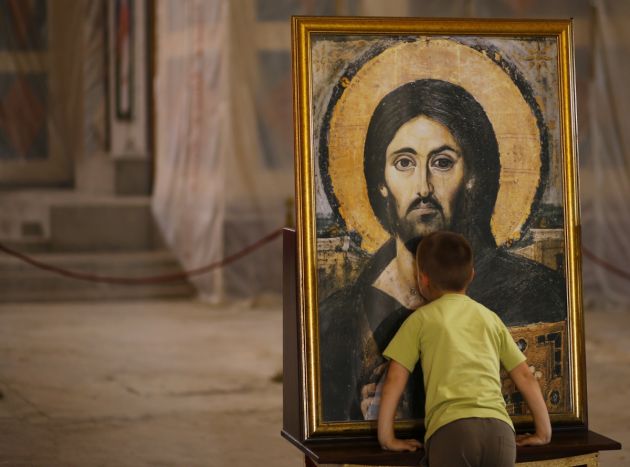Stop denying others' cultural heritage, says UN expert after Serbia and Kosovo visits

United Nations human rights expert Karima Bennoune says she is concerned at the high level of politicization of cultural heritage issues in Serbia and in Kosovo relating in part to both Christian and Muslim sites in the two countries.
She said this in an Oct. 14 statement at the end of her first fact-finding mission to Serbia and Kosov noting that such politicization "reduces cultural heritage to a tool and produces monolithic discourses not appropriate in diverse societies."
"Everyone, including Serb, Albanian, Roma, Orthodox, Muslim and Jewish people and all minorities, as well as secular people, women, LGBT people, persons with disabilities and people of mixed identities make significant contributions to cultural heritage and the existence of a vivid cultural life," said Bennoune.
"This must be recognized."Autonomous Province of Kosovo and Metohija
UN Special Rapporteur in the field of cultural rights visited Serbia and Kosovo from Oct. 3 to 14 and conducted the visit to address tensions regarding cultural heritage arising between Serbia and Kosovo.
She also looked more broadly at the right to take part in cultural life without discrimination in Serbia and in Kosovo.
"Serbia and Kosovo must understand how crucial it is to view cultural heritage issues from a human rights perspective, based on the rights of all people without discrimination to participate in cultural life, to access and enjoy cultural heritage, to freedom of expression, thought, conscience and religion, and to education in particular," she noted.
Kosovo is a disputed territory and partially recognized State in Southeast Europe that declared independence from Serbia in February 2008 as the Republic of Kosovo. Serbia recognizes administration of the territory by Kosovo's elected government, but it claims it as its own Autonomous Province of Kosovo and Metohija.
Of Kosovo's 1.8 million people, Muslim make up more than 95 percent of them, Roman Catholics 2.2 percent and Orthodox Christians 1.5 percent.
In Serbia, 85 percent of the 7 million people are Serbian Orthodox Christians, 5 percent are Catholics and 5 percent Muslims.
The Special Rapporteur urged Serbia and Kosovo to de-link cultural heritage matters from nationalistic agendas.
"There should be no monolithic view of what constitutes or can constitute cultural heritage, and cultural heritage should never be used to construct discourses or policies aimed at the exclusion of others," she stressed.
"I encourage everyone to understand cultural heritage in a holistic way, including the contributions and perspectives of all groups," Bennoune stressed.
A pressing issue is the fate of the cultural heritage of the Serbian Orthodox Church in Kosovo much of which consists of living monuments vital to the enjoyment of human rights.
"I was particularly sorry to hear or read disparaging discourses disputing the importance of the cultural heritage of the Serbian Orthodox Church in Kosovo, or intentionally omitting mention of the specific relationship of the Serbian Orthodox Church with certain sites.
KOSOVO ALBANIANS
"Conversely, I regret discourses minimizing the importance or even the existence of the cultural heritage of Kosovo Albanians. Both discourses are damaging to human rights and equally offensive," she added.
The UN specialists was able to meet representatives of civil society from diverse backgrounds eager to combat such perspectives and organize joint events with people of mixed backgrounds to visit each other's sites of cultural significance.
She said a lack of funding often curtailed such activities and urged support, from Serbia, from Kosovo, and the international community.
"There is a clear need for mutual acknowledgment of the harm that has been done in the past by attacking heritage related to various groups, and the suffering this has caused. Lasting peace and reconciliation require no less".
Bennoune referred to the many reports of widespread attacks against and destructions of mosques, historic centers and cultural sites such as archives committed by Serbian security forces and paramilitaries in 1999 in Kosovo. She also referred to similar acts against churches committed by the Kosovo Liberation Army.
The UN specialist also referred to the intentional destruction of, in particular, 35 listed Orthodox monuments and churches between March 17 and 19, 2004, followed by a number of attacks and incidents against Serbian orthodox cultural heritage since then.
She likewise regretted retaliatory attacks during the events of March 2004, including one on the workshop of Kosovo Albanian sculptor Agim Èavdarbaša in Pristina, as well as those against two mosques in Niš and Belgrade.
"I condemn unreservedly all of these attacks and destructions of cultural heritage and insist on all necessary steps being taken to prevent any repetition and to hold perpetrators accountable, in accordance with international norms."
Bennoune expressed appreciation at reports from different sources acknowledging the dedication and increased capacity of the Kosovo police for the protection of sites as she cited its specialized unit for the protection of cultural heritage a multi-ethnic unit.
She also noted the reported decrease in the number of security incidents involving cultural heritage along with allegations that statistics do not entirely reflect the reality.
"I also heard ongoing concerns from Serbian Orthodox monks and nuns who are uncertain about security and long to feel welcome and accepted," she said.